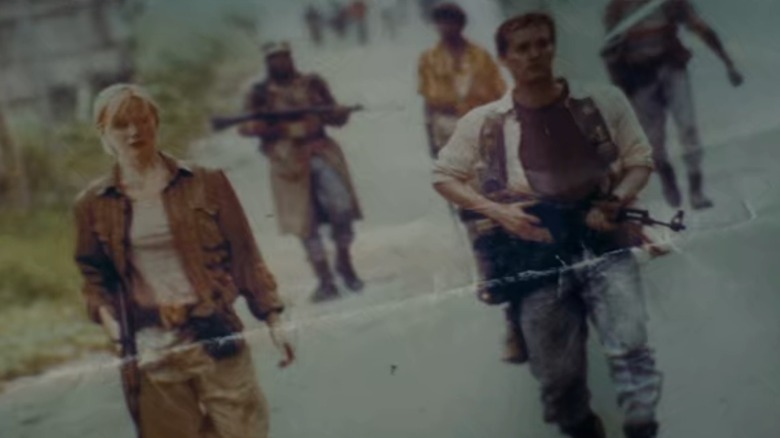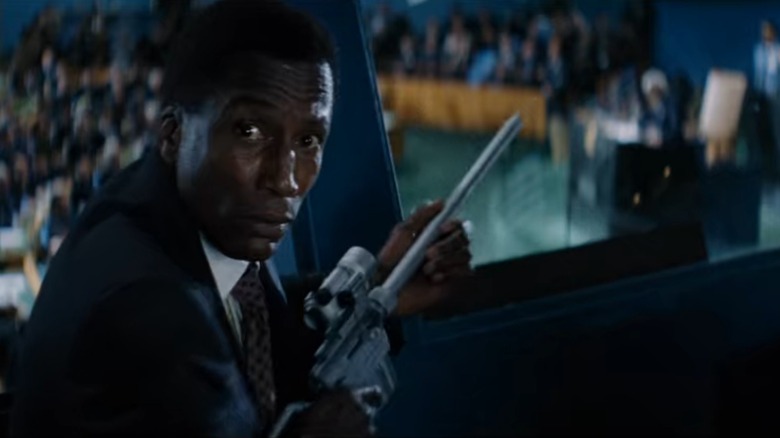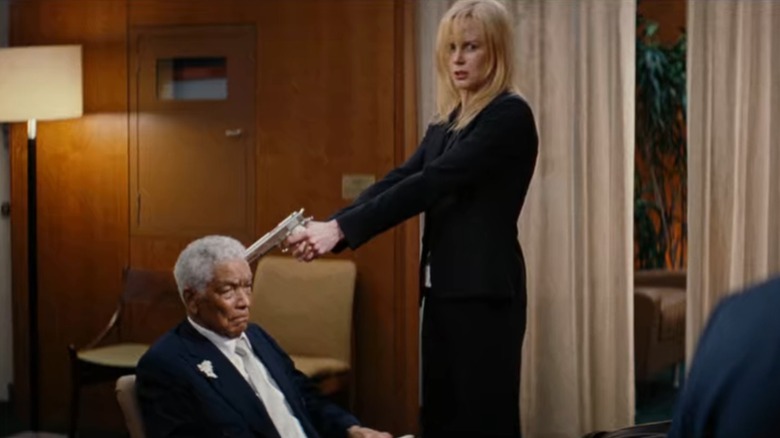The Ending Of The Interpreter Explained
Things are not well in the fictional African nation of Matobo. After decades of political unrest and brutal government crackdowns, the country's leader, Edmond Zuwanie (Earl Cameron), is at risk of being tried in the International Criminal Court. Zuwanie was once considered a heroic liberator who freed Matobo from colonial rule. However, in recent years, he's known more for the horrific reign of violence his security forces have meted out across the country. It seems that with the possibility of sanctions looming, Zuwanie is at risk of losing his grip on power. But the UN isn't the only threat he faces.
"The Interpreter," which is currently having a moment on Netflix, puts a focus on Silvia Broome (Nicole Kidman), a Matoban herself who uses her formidable skills as a linguist in her job as an interpreter for the UN. One night while in her office, Silvia overhears people talking somewhere in the building. The conversation is happening in Ku, the native language of Matobo, and the participants are discussing a plan to assassinate Zuwanie when he arrives to address the UN.
When she reports this apparent threat, secret service agent Tobin Keller (Sean Penn) is assigned to the case. As he investigates Silvia's claims, he begins to realize that this is not a simple political assassination. There is a web of secrets surrounding Zuwanie's upcoming visit. One he realizes Silvia herself is caught up in.
Who is plotting to kill Edmond Zuwanie? What goals are they hoping to achieve? And what has Silvia Broome been hiding about her past? This is what you need to know about the ending of "The Interpreter."
Keller uncovers the secrets of Silvia's past
As Keller's investigation heats up toward the end of the film it becomes clear that regardless of whether she's involved in the assassination plot against Zuwanie, Silvia is hiding something. Those suspicions are confirmed when Keller gets a hold of a picture of a group of anti-Zuwanie guerilla fighters, one of whom appears to be Silvia. When he confronts her about the picture, he learns that she's not merely a linguist who left Matobo to find better opportunities.
Silvia reveals that after her parents and sister were killed by landmines placed by Zuwanie's forces, she briefly joined an anti-Zuwanie guerilla group. At one point she was even romantically involved with Ajene Xola (Curtiss Cook), the leader of the dissident African Freedom Party.
However, Silvia is adamant that she is no longer interested in using violence as a means to an end. She tells Keller that she was once forced to kill a child who was fighting for Zuwanie and after that, she put down her gun, which eventually led her to the UN. "I walked away from Africa with nothing ..." she explains, "Just a belief that words and compassion are the better way."
But later when Keller breaks the news that Silvia's brother Simon (Hugo Speer), with whom she had no direct contact for safety reasons, had been killed by Zuwanie's men, Silvia is wracked by grief. While Keller no longer suspects she's involved in the assassination plot, when she slips the protective duty that was assigned to keep her safe and disappears, he knows she is up to something.
Who was actually behind the attempt on Zuwanie's life?
After Silvia goes missing, Zuwanie arrives for his big speech at the UN. Keller has untangled several components to the mystery swirling around his visit, but he still hasn't determined who is trying to kill Zuwanie and why. That all changes when he gets a lead that points him in the direction of a member of the Matoban UN delegation named Marcus Matu (Michael Wright).
As Zuwanie gives his address, Marcus assembles a sniper rifle in a viewing booth that looks out directly onto the stage. But before he takes his shot, Nils Lud (Jesper Christensen), the head of security for the Matoban UN mission, enters the room.
Marcus lines up the rifle and pulls the trigger but it doesn't fire. Unbeknownst to Marcus, he was set up. While he thought he had been tapped to carry out an assassination on Zuwanie, he had actually been chosen to take the fall for an assassination attempt that was never actually meant to happen.
By this time, Keller has finally cracked the puzzle. There never was a plot to kill Zuwanie. Rather, it was a plot to stage an assassination attempt to try and give the embattled dictator a heroic incident to survive that would potentially help him avoid indictment. When Keller arrives at the booth, Lud tries to tell him that he stopped Marcus just before he was able to kill Zuwanie. However, Keller sees through his lies and accuses the man of orchestrating the plot.
In the meantime, Zuwanie has been moved to a safe room. But just because the assassination attempt was a false flag doesn't mean he's out of danger yet.
Silvia's endgame is revealed
When she disappeared the night before, Silvia did not, as Keller assumed, go back to Matobo. Instead, she hid in the safe room that Zuwanie was eventually moved into. When he's alone, she reveals herself and snatches a pistol that he keeps on his person.
Through tears, Silvia tells Zuwanie that when she was a child, she had great admiration for him and hope for Matobo. However, his subsequent crimes against humanity left her shattered. Silvia is carrying a tremendous amount of grief throughout the movie and her sadness at her former hero becoming an authoritarian dictator is palpable.
Keller arrives and tries to persuade Silvia to put the gun down by telling her that Zuwanie is on the verge of being put on trial for his crimes. But Silvia is a woman of deep contrasts. Earlier in the film, she told Keller that following her stint as a guerilla, she dedicated herself to a path of change through peace and compassion, even if it takes longer than violence. However, it appears that following her brother's death and the discovery of his notebooks that contained documentation of countless political murders, she has had a relapse. Perhaps peace and compassion aren't things Silvia actually believes in, but rather things she wants to believe in, despite the fact that her instincts often lean toward violence.
The Interpreter ends with a meditation on grief
Ultimately, Silvia lets Zuwanie live and he does end up standing trial for his crimes. For her own wrongdoing, Silvia is deported back to Matobo. Before she leaves, she and Keller have one final meeting. The pair had bonded over their shared grief throughout the film, Silvia's stemming from her brother and her pain over the situation in her home country, and Keller's from the very recent death of his wife. During their meeting, he finally shares his wife's name with her.
In response, Silvia says something to him in Ku, which he guesses to mean, "Rest in peace?" She smiles at him and replies, "Close enough."
With this ending note, the film seems to be making a point about grief, whether it be personal, like the death of a family member, or political, like the loss of idealism. When terrible things happen there isn't always a solution that will put everything back together. Sometimes you have to do what you can and hope to arrive at "Close enough."




